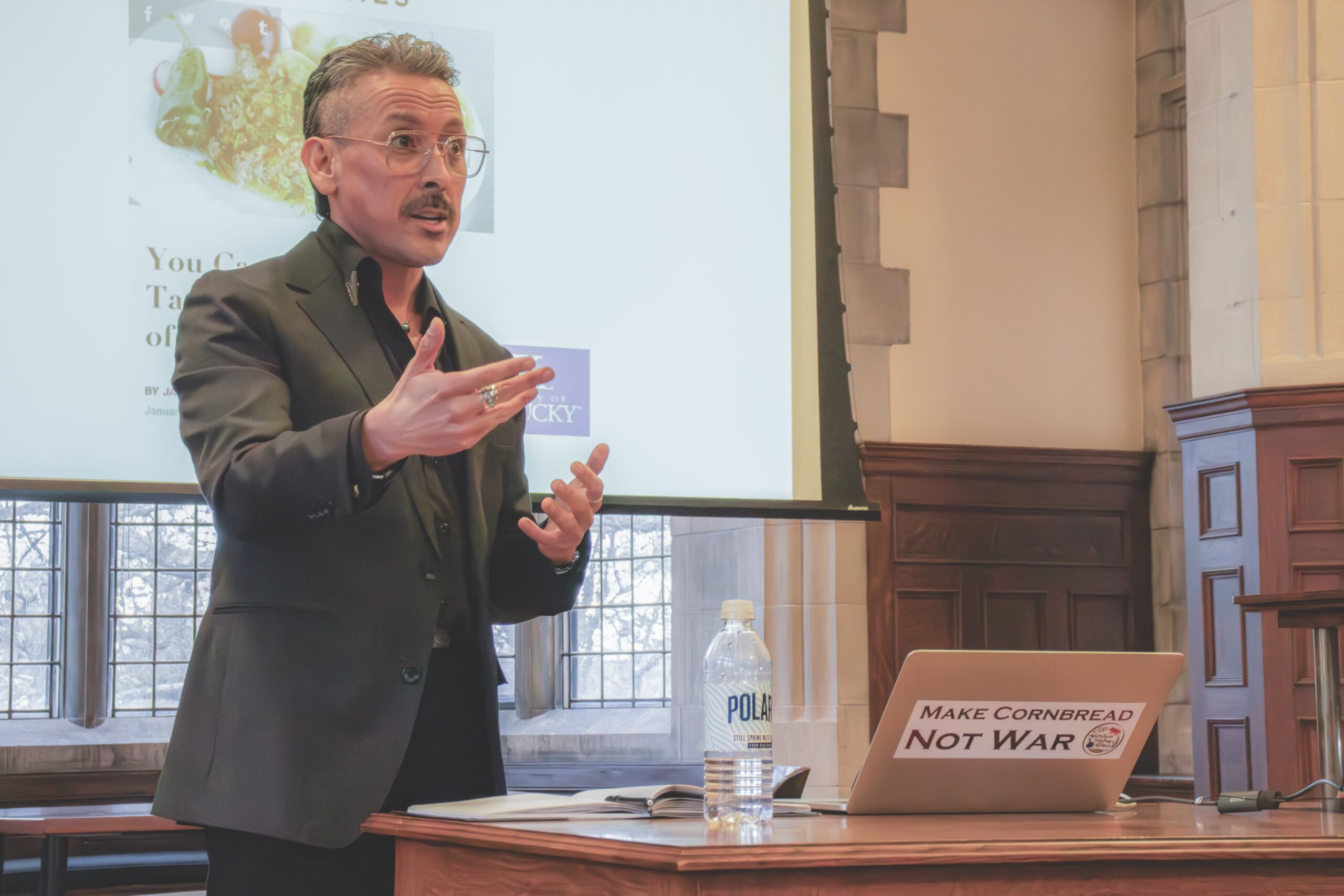“Taco Literacies”: Alvarez talks foodways and cultural literacy
April 26, 2024
 Isa Cruz
Isa CruzOn Wednesday, Professor of English at St. John’s University Steven Alvarez presented in the Shannon Room on how he uses tacos as a mechanism for exploring the importance of foodways and literacy in Mexican-American culture and traditions in his popular class “Taco Literacies.”
Alvarez defined foodways as the intersection of food, culture, tradition and history, including the social and economic practices affecting the production and consumption of food. Alvarez also said that literacy is contextually and culturally specific and emphasized that it is something that is practiced, not inherent. He linked these two terms with the phrase “en confianza,” which describes the trust or confidence built between people over time.
“Think back, who’s the person who taught you how to read?… Who was the person who shared that literacy with you? And then imagine this, that same person probably fed you too,” Alvarez said. “This way, literacy is about care, it’s about trust, in the same way [it is] about food.”
Alvarez argues that understanding food as a form of cultural literacy in Mexican-American culture is ever-important, given migration and changing regional demographic trends showing an increasing Hispanic population in the U.S. over the past several decades. He noted the important role food plays in shaping a community’s history and traditions, focusing on Kentucky and New York City as examples and places he has lived recently.
Alvarez first taught “Taco Literacies” at the University of Kentucky, where his class primarily consisted of white students. He said that the course received extensive media coverage, and some critics accused him of “dumbing down” higher education. Alvarez noted the controversy of the course’s focus on migration at the university took place during the 2016 presidential elections. Alvarez took these challenges in stride, focusing on making the culinary framing culturally accessible.
“With these students in Kentucky, I had a hard time teaching them, but later on I realized that all those issues of migration, bilingualism, inequality and migration to the Bluegrass can all be encompassed in Mexican food. [The students] were really interested in Mexican food, but they weren’t interested in some of the Mexican people,” Alvarez said, “But you can’t have the food if you don’t have the people, and it tastes better if you love us, anyway.”
When Alvarez began teaching at St. John’s University in Queens, his experience was completely different. The students he taught came from more diverse backgrounds and had a wide range of prior experiences with Mexican food. He encouraged all his students to learn from each other, from having them share their favorite Mexican foods to inviting a student’s friend to class to talk about her family’s Mexican restaurant.
“New York City is a much more diverse place, so I had less resistance of people that were talking about immigration, because a lot of my students came from other parts of the world,” Alvarez said.
Attendee Anna Diaconu ’24 reflected on the different relationships between food, literacy and culture that Alvarez explored in his talk and course.
“I’m really intrigued by the idea of food as a text and the way that we value knowledge in a very specific way, and the way that this ancestral knowledge is not as valued in this context as something like a taco,” Diaconu said.
Additionally, Alvarez discussed that while the topic of the course is tacos, it is first and foremost a writing class. Alvarez emphasized that he grounds writing in justice and democracy. He uses the context of local and global histories and struggles in his approach for teaching writing.
“I’m very much communicating about the world but also thinking about the world and how writing can be part of it,” Alvarez said. “We can see this happening through Mexican food, but also you can imagine other ways to do this kind of writing.”
Visiting Assistant Professor of English Zahir Janmohamed, who is teaching “Writing the History, Culture, and Politics of Food,” this semester, invited Alvarez to campus. Janmohamed said he had been hoping to bring Alvarez to Brunswick since he first began teaching at Bowdoin. After the talk, Janmohamed invited attendees to join his class by getting tacos for dinner.

Comments
Before submitting a comment, please review our comment policy. Some key points from the policy: